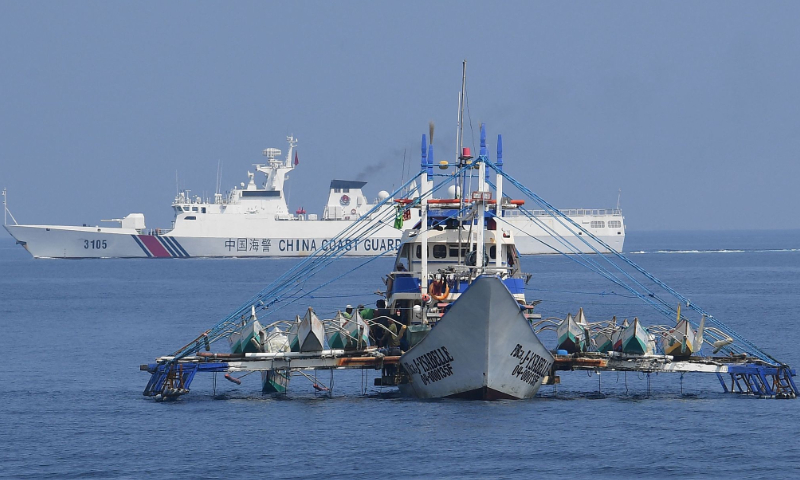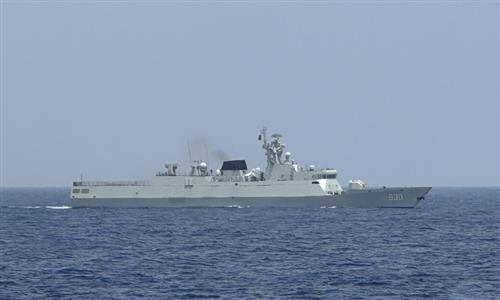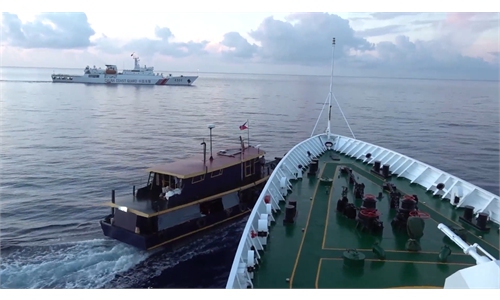China warns US, Philippines not to harm its sovereignty, rights
Joint patrol shows 'poor military capability, nothing meaningful but bluffing'

Chinese coast guard (back) conducts patrol missions in the waters near Huangyan Island in the South China Sea on September 20, 2023. Photo: VCG
China on Wednesday warned the US and the Philippines that their recent joint naval patrols near Chinese territorial waters should not harm China's sovereignty and maritime interests, with analysts saying the military activities by Washington and Manila showed the two countries have no sincerity to ease tension.
Chinese military experts said the vessels and aircrafts that are participating in the patrol showed poor combat capability and lack of effective collaborative capacity between the Filipino and US navies, and tactically, they are unable to bring a significant challenge to China's advantage in law enforcement and national defense over relevant regions.
In fact, the analysts noted, the US intends to use the Philippines to complicate regional issues even further, while other regional countries choose to solve disputes with China by negotiation. The US also wants to strengthen its military presence around the Taiwan Straits to provoke China over the Taiwan question.
Warning sent
Mao Ning, a spokesperson of the Chinese Ministry of Foreign Affairs, when asked about the latest military acts by the US and the Philippines, told a routine daily press conference on Wednesday that "the Chinese side has made clear about the stance toward the Philippines and the US," saying that the patrol should not harm China's territorial sovereignty and maritime rights and interests.
The militaries of the Philippines and the US launched joint patrols on Tuesday in waters near the island of Taiwan, officials of Manila said, Reuters reported, saying that this could be a move to "fan further tension with China."
Security engagements between Washington and Manila have soared this year, including a decision to almost double the number of Philippine bases the American military can access, some of which are facing the island of Taiwan, and their largest-ever joint military drill in April, according to the report.
This week's three-day joint air and maritime exercise was a "significant initiative" to boost interoperability between the two, Philippine President Ferdinand Marcos Jr said, Reuters reported.
Xu Liping, director of the Center for Southeast Asian Studies at the Chinese Academy of Social Sciences, told the Global Times on Wednesday that Washington and Manila want to show their alliance is strong and stable. "When the US wants to use its ally to present its military hegemony in the relevant waters, the Philippines is trying to use the US military presence to back its illegal claim over the South China Sea, and Manila also wants Washington to provide more military assistances."
"China will be calm in handling the situation. We urge the US and the Philippines to keep their promise, and the US should implement the consensuses recently reached by the heads of state of both sides in San Francisco, rather than creating new frictions. We also urge the Philippines to abide by the Declaration on the Conduct of Parties in the South China Sea, and not to complicate and escalate the tension," Xu noted.
Zhang Junshe, a Chinese naval expert, told the Global Times on Wednesday that "currently, all other relevant parties of the South China Sea issue support and agree to solve disputes with China via negotiation and coordination, and they don't want other non-regional forces to get involved to make the situation more complicated and intense."
The Philippines' attempt to seek the external force's support to serve its selfish demand will worsen the South China Sea situation and harm regional peace and stability, so Manila's acts won't be welcomed by other regional countries, Zhang noted.
Useless bluffing
Chen Xiangmiao, director of the World Navy Research Center at the National Institute for South China Sea Studies, told the Global Times on Wednesday that the joint patrol enables the US to show a certain level of diplomatic support, attempts to deter China and attract other countries like Japan and Australia to join similar activities in the future.
But judging from the participating forces, the joint patrol is more of a diplomatic show with limited military significance, Chen said.
While the P-8A patrol aircraft can contribute to the US' situational awareness by conducting reconnaissance on Chinese submarine and surface vessel activities, the littoral combat ship is only useful in close-in reconnaissance operations with diplomatic and political aims, and not suitable for combat operations, Chen said, noting that the Philippine' warships and warplanes are not operationally significant in the South China Sea.
Wei Dongxu, a Beijing-based military expert, voiced a similar opinion, as he told the Global Times on Wednesday that the US did not send very capable forces to the joint patrol, and the Philippine forces' capabilities are limited.
But the US is encouraging the Philippines to use its less capable military forces to spearhead provocative activities in sensitive air and maritime regions in the South China Sea and around the island of Taiwan, Wei said. "This harbors an ulterior motive."
The US is enhancing its military cooperation since this year so it can optimize its strategic encirclement on China by finding more military footholds in the South China Sea, Wei said.
With the Philippines' limited military capabilities, the southern part of the first island chain had been a weak point in encircling China compared with the northern part in Japan and the middle part in the island of Taiwan, experts said.
Zhang said the joint patrol is a large-scale bluff, and with the huge gap between the capabilities of the US and Philippine militaries, they can hardly form interoperability.
The reason why the joint patrol started in the northernmost point of the Philippines is that the US wants to seize the chance to control the strategically important Bashi Channel, Zhang said.
The island of Taiwan is only little more than a hundred kilometers away from there, so the US military is also in fact preparing for a potential military interference in the Taiwan question, Zhang said.
However, with China's national defense development, the US is gradually losing military capabilities in interfering with the Taiwan question or the South China Sea issue despite its efforts to enhance them, analysts said. Some joint exercises or patrols, or some additional bases and deployments on China's doorstep pose no real threat to the Chinese People's Liberation Army, which now has complete, comprehensive systems of monitoring, tracking, identifying, targeting, hitting, destroying and evaluating all types of targets in the region, they said.
The Philippines should know that the US will not have itself involved in a potential conflict between China and the Philippines, and that the US and the Philippines' back-scratching have its limits, experts said.




